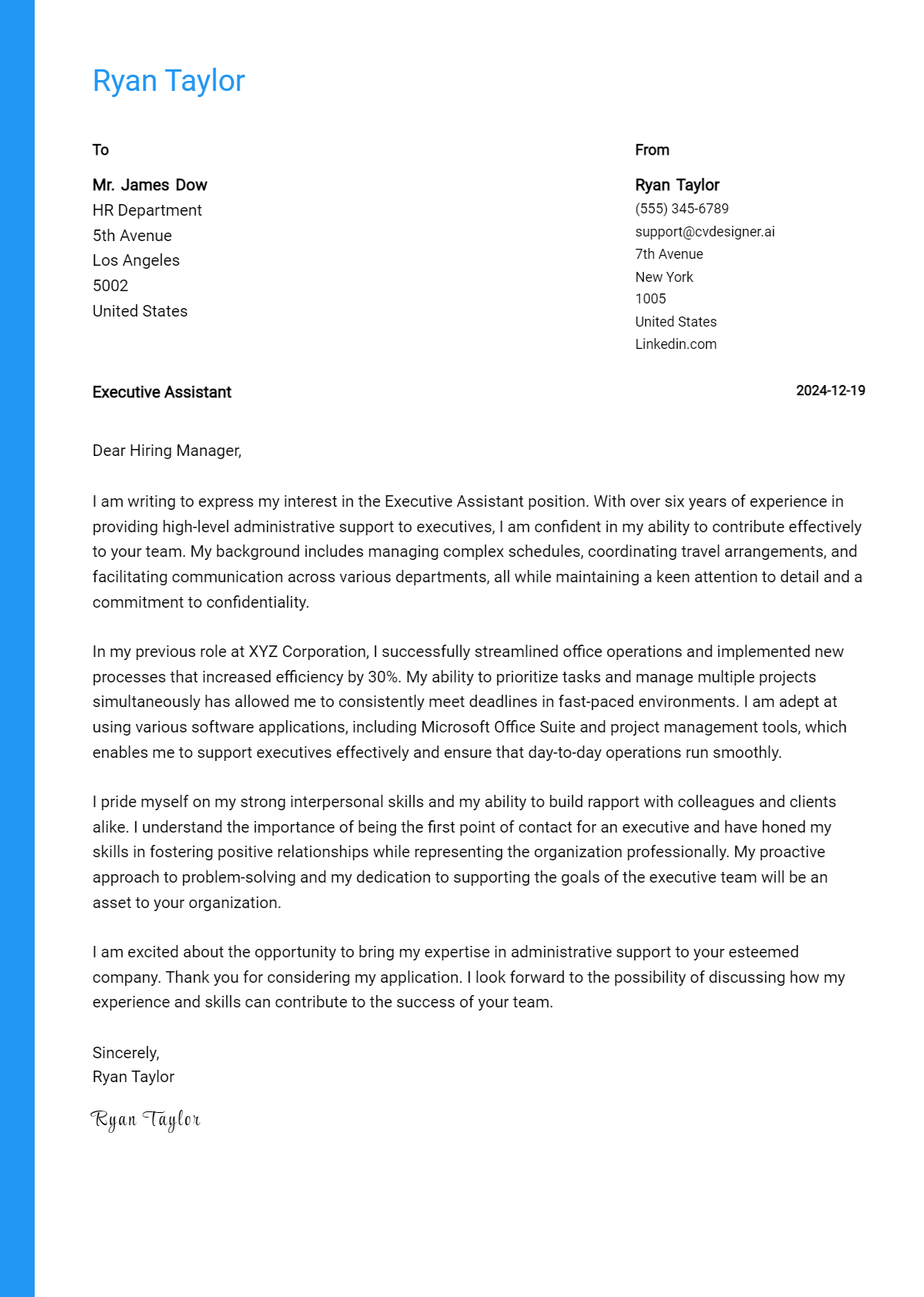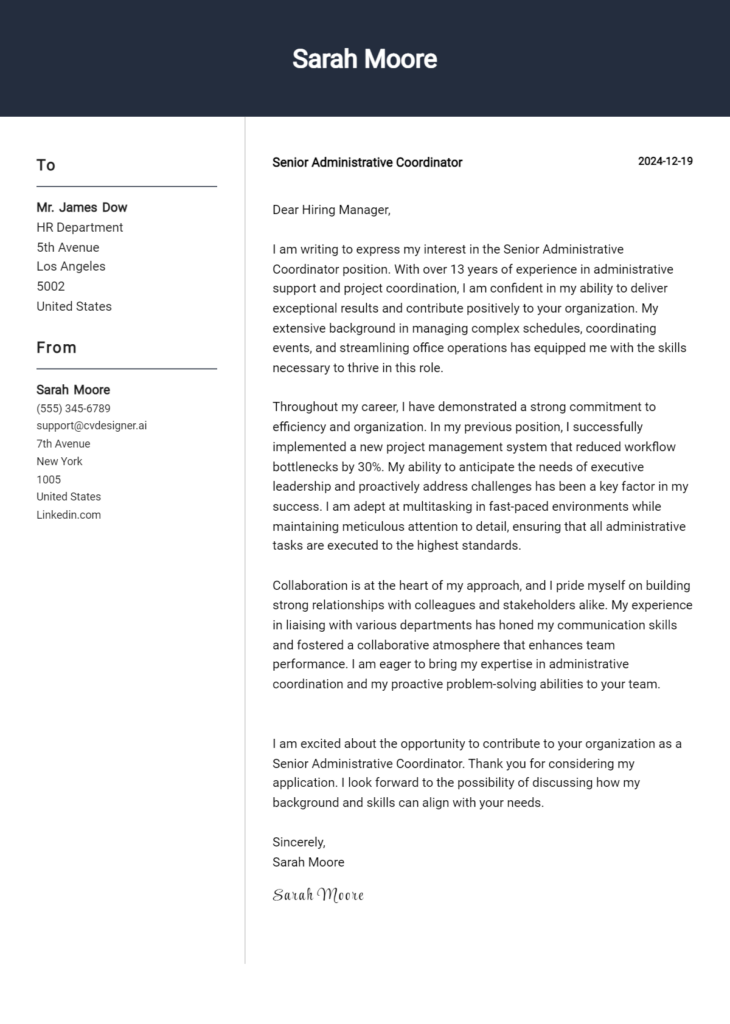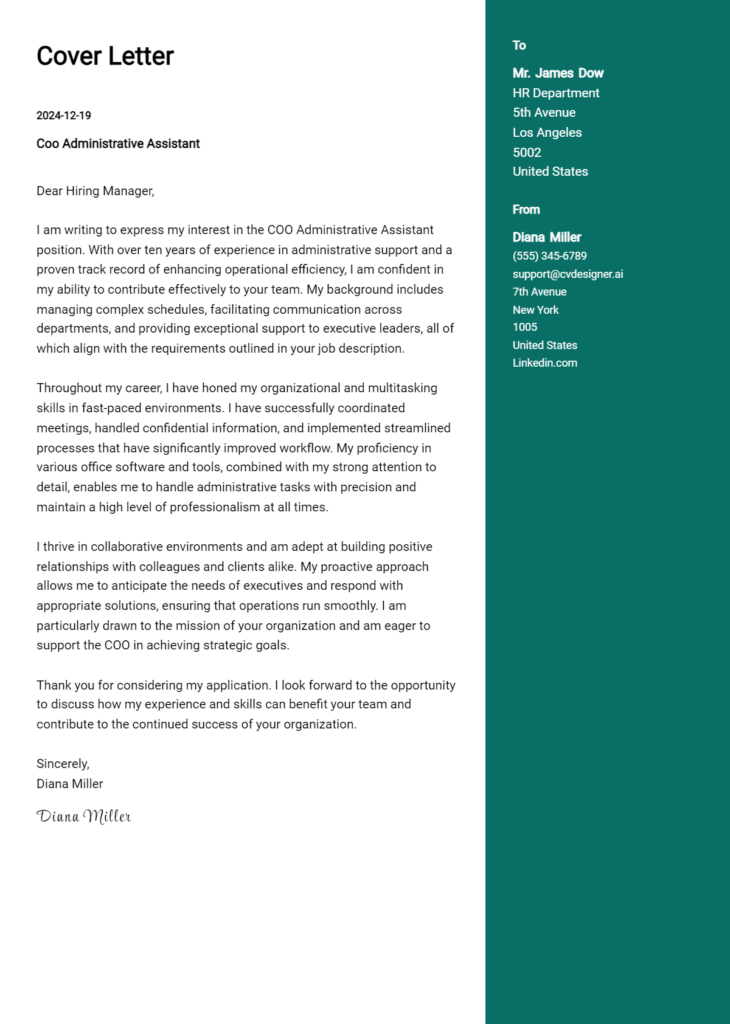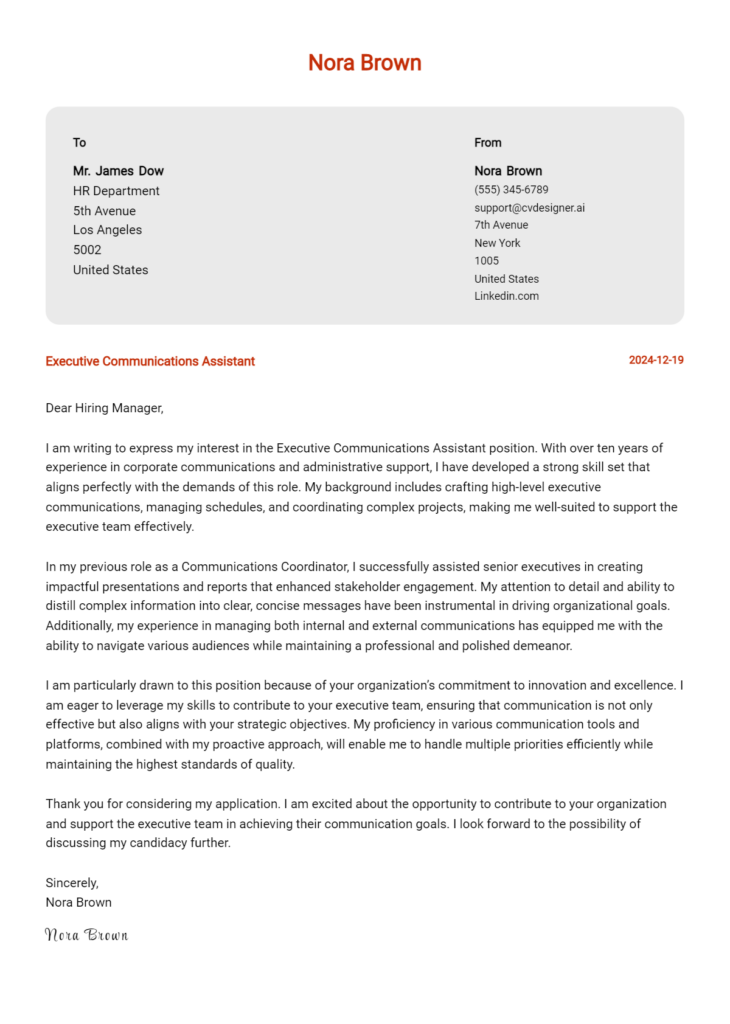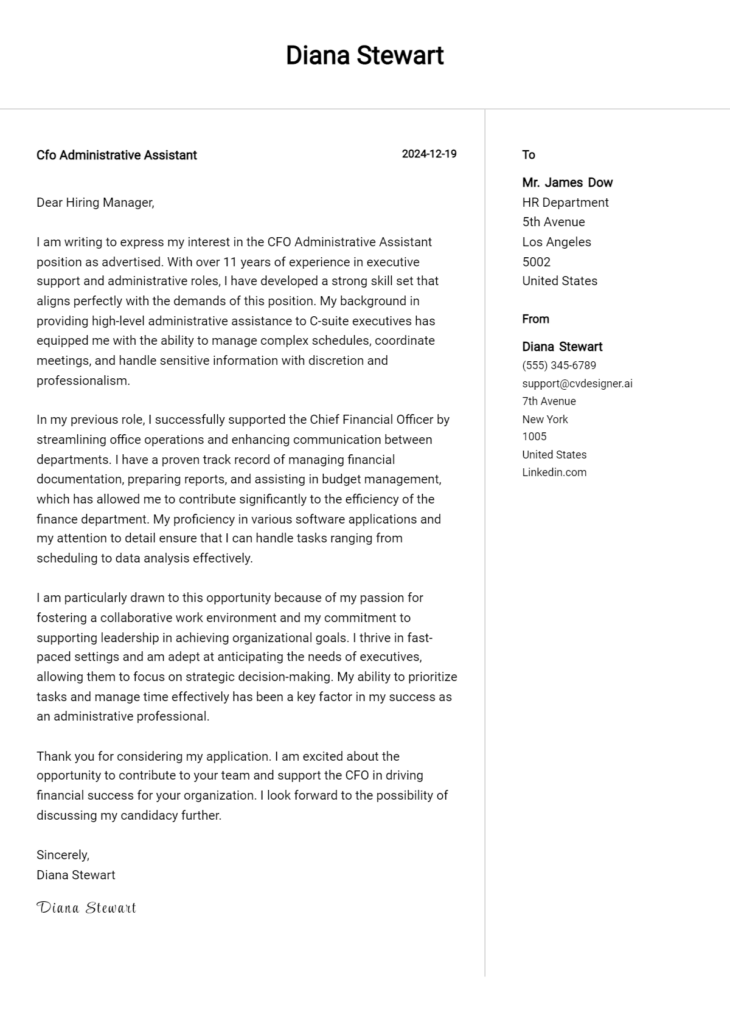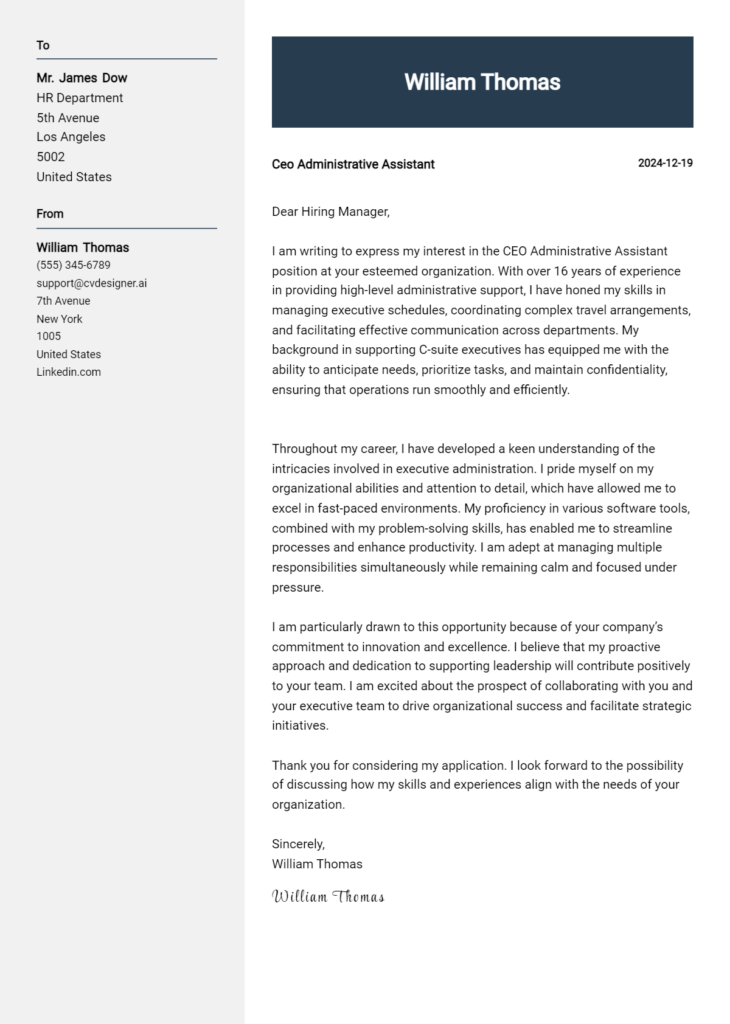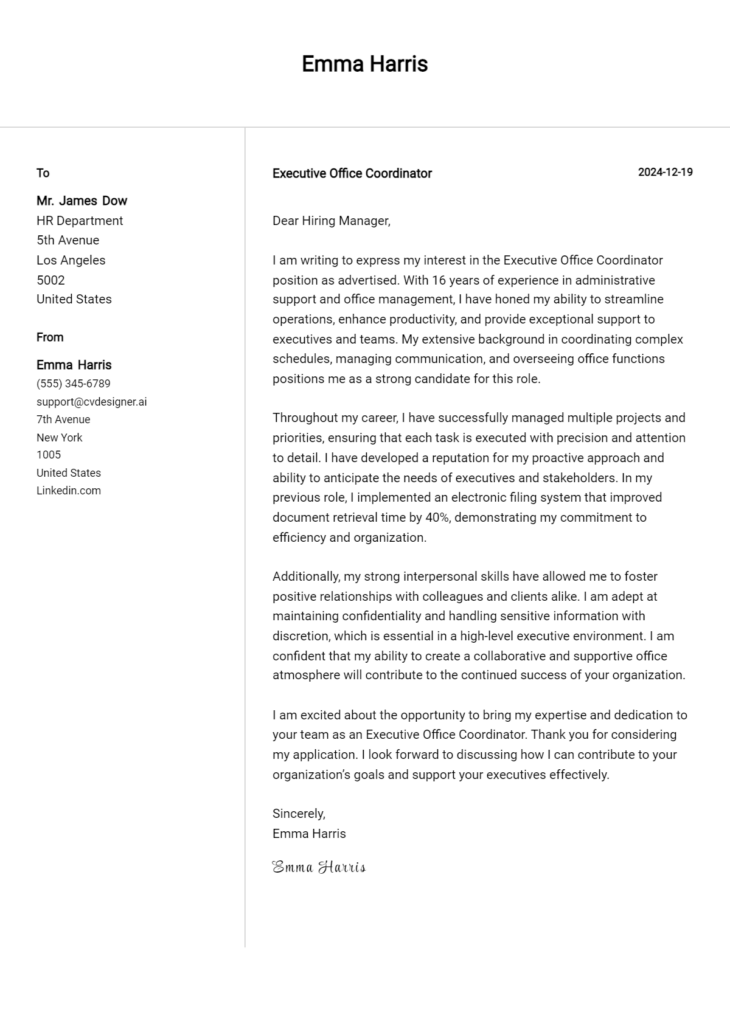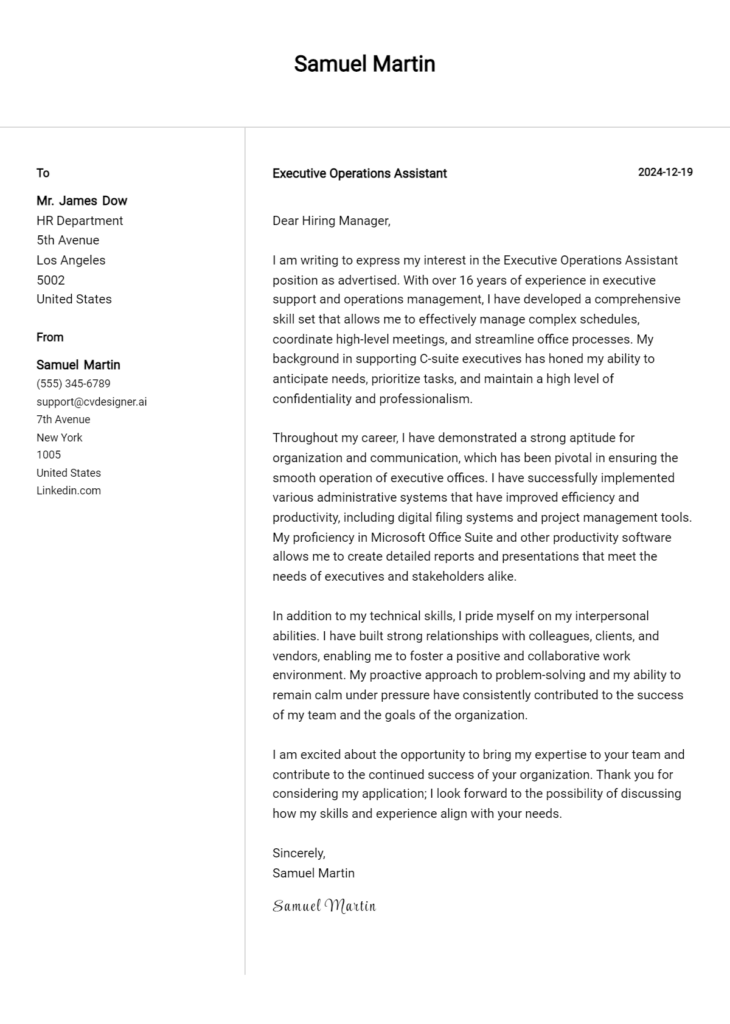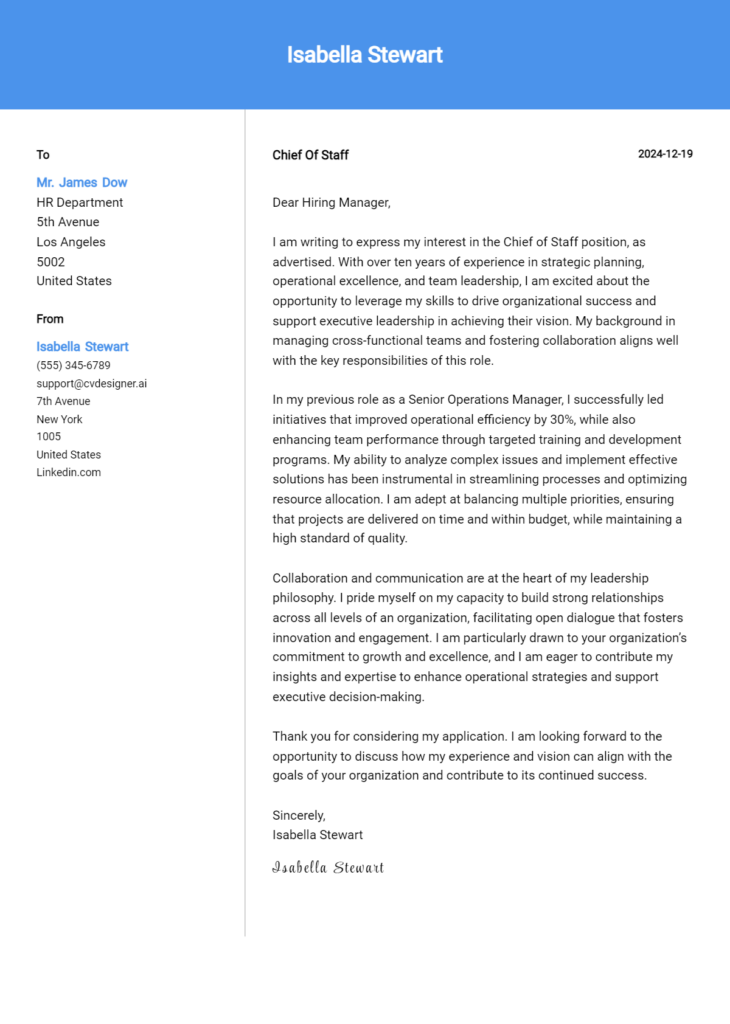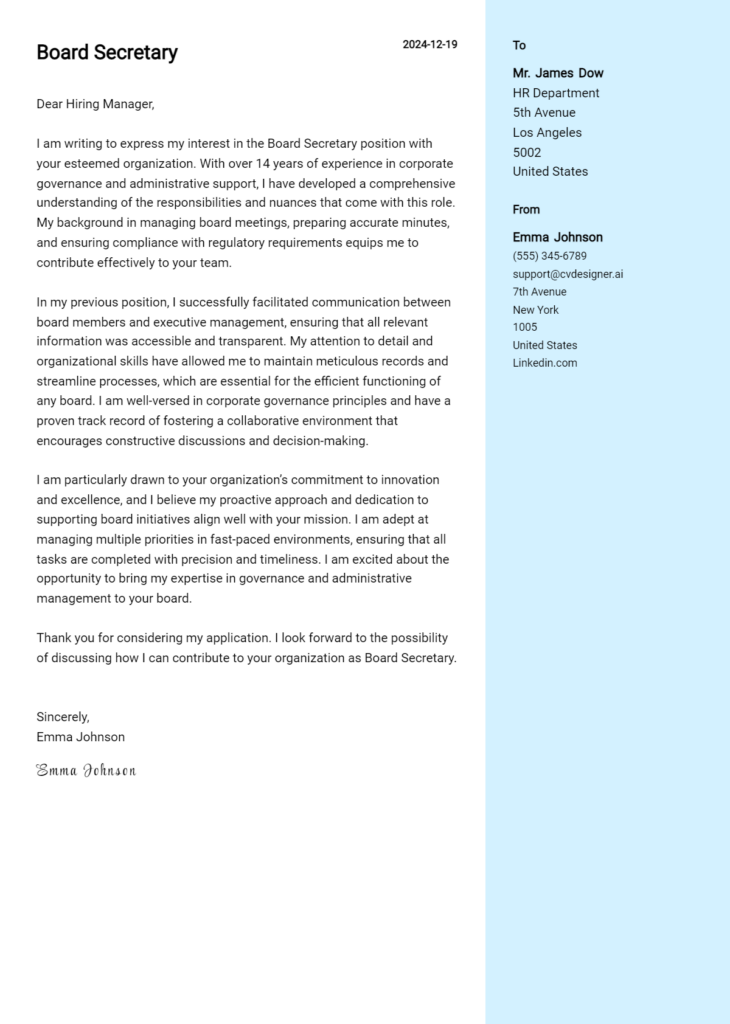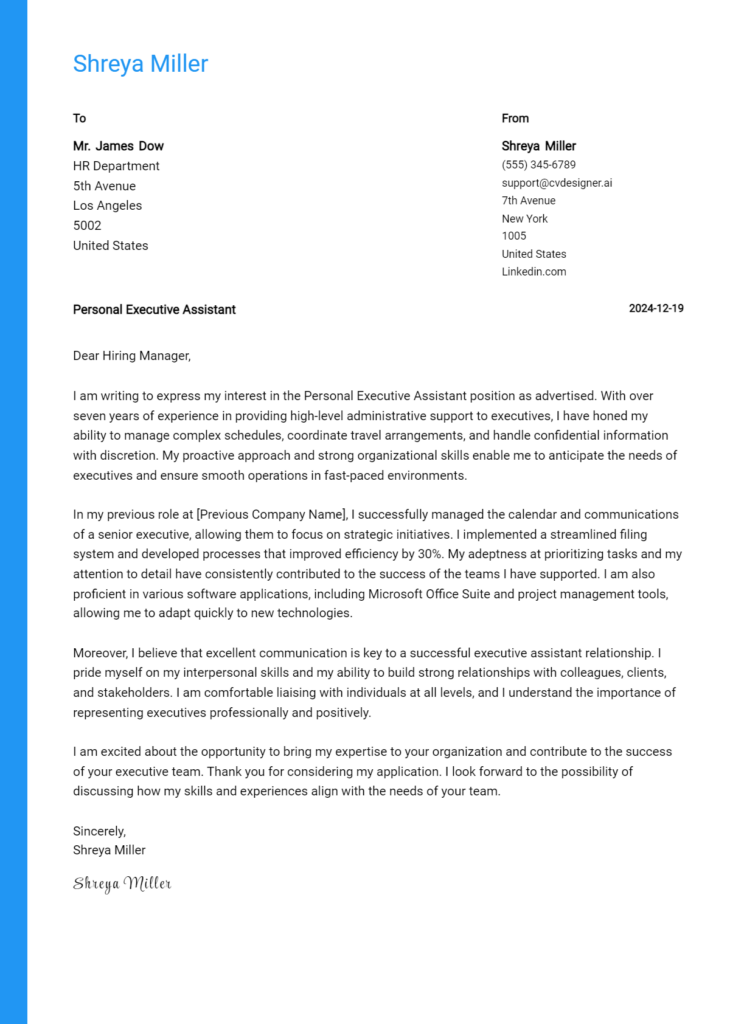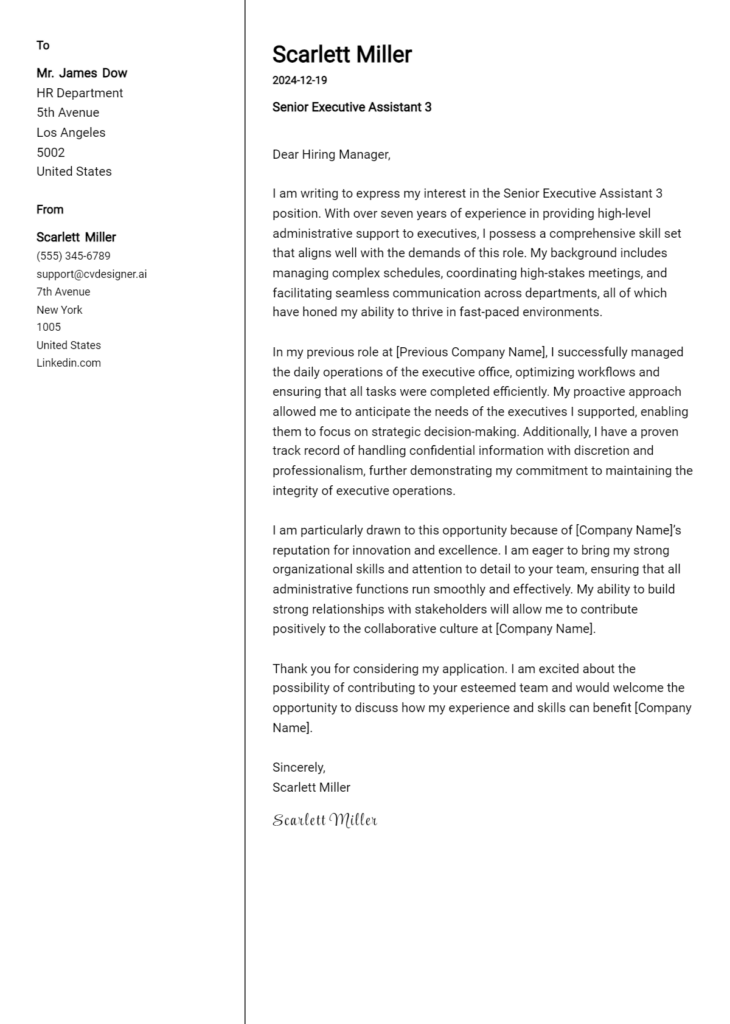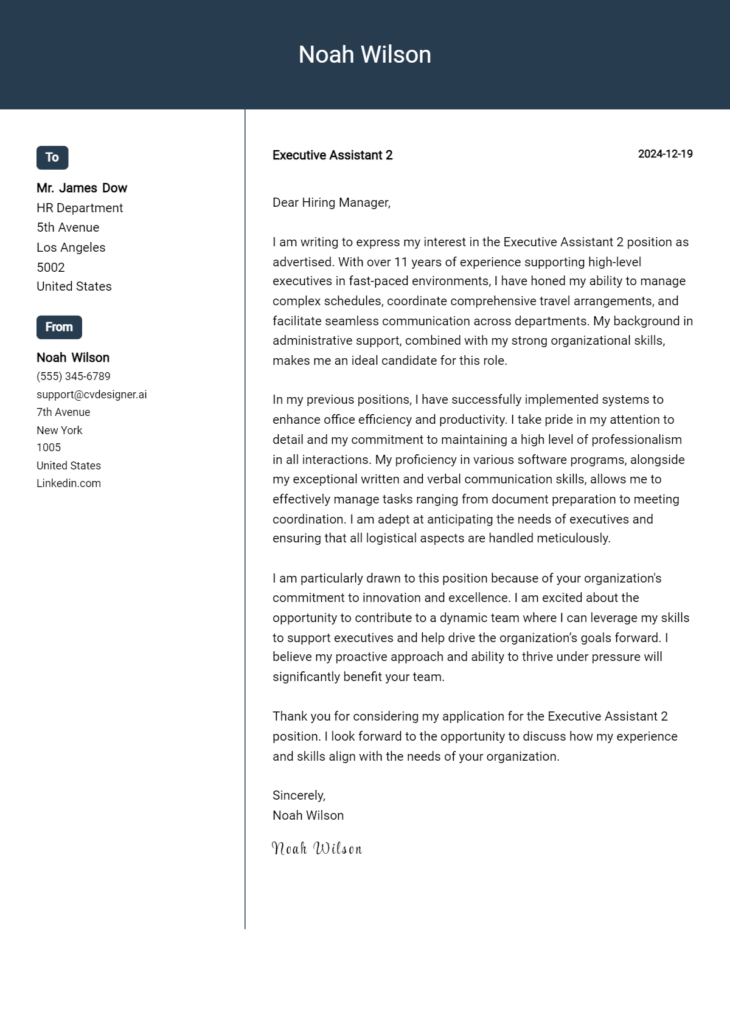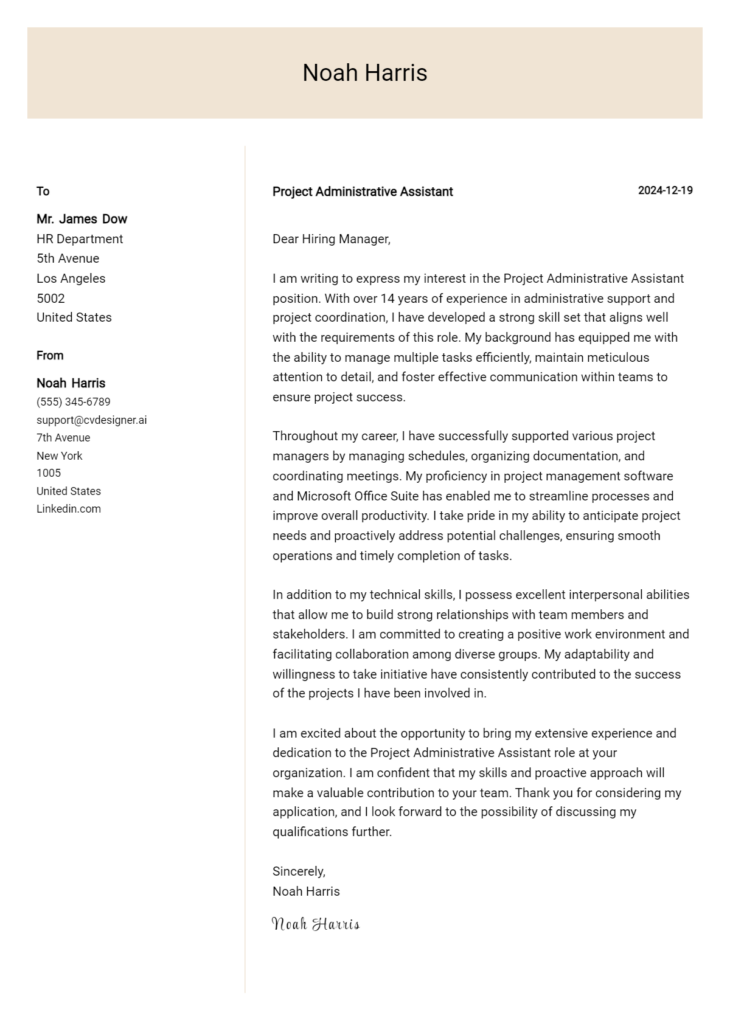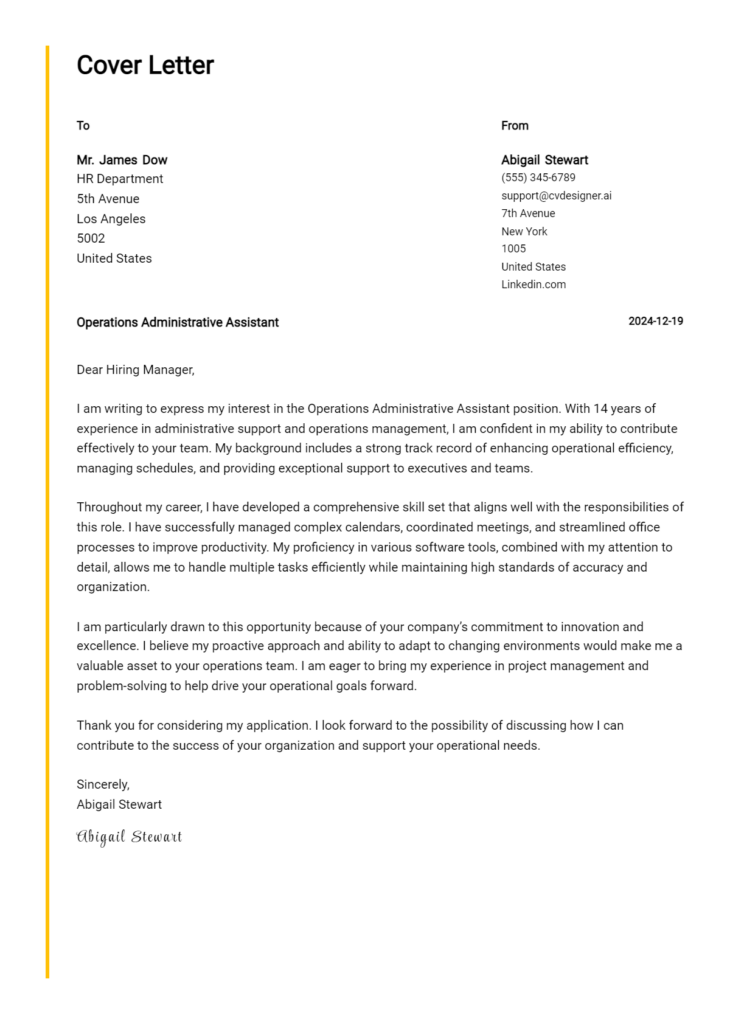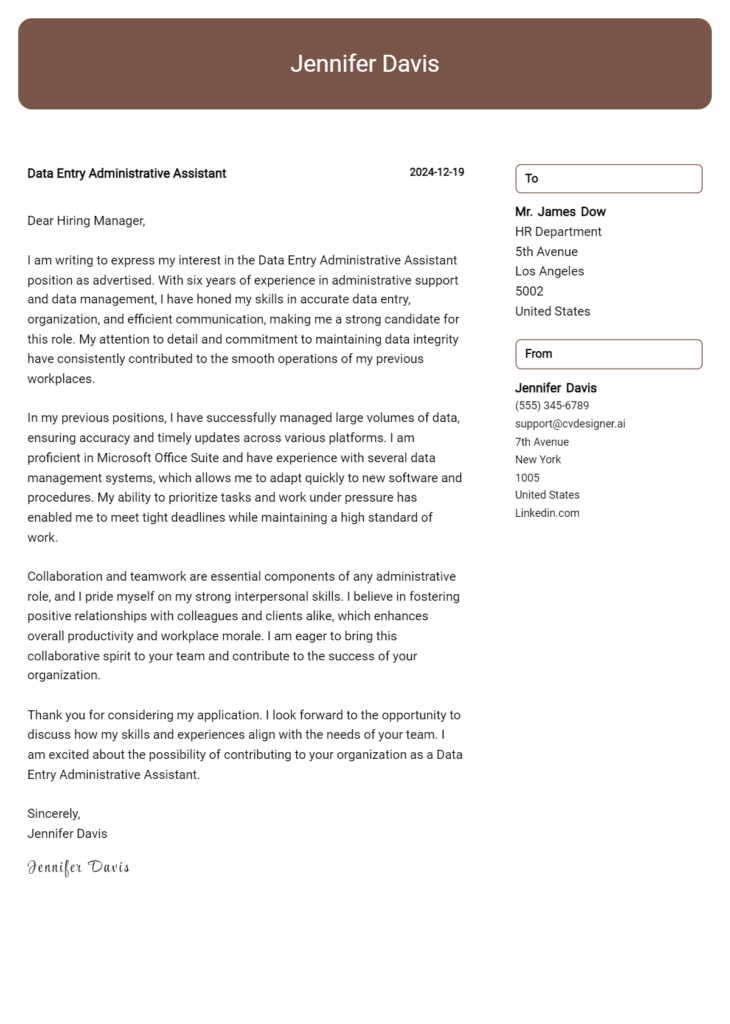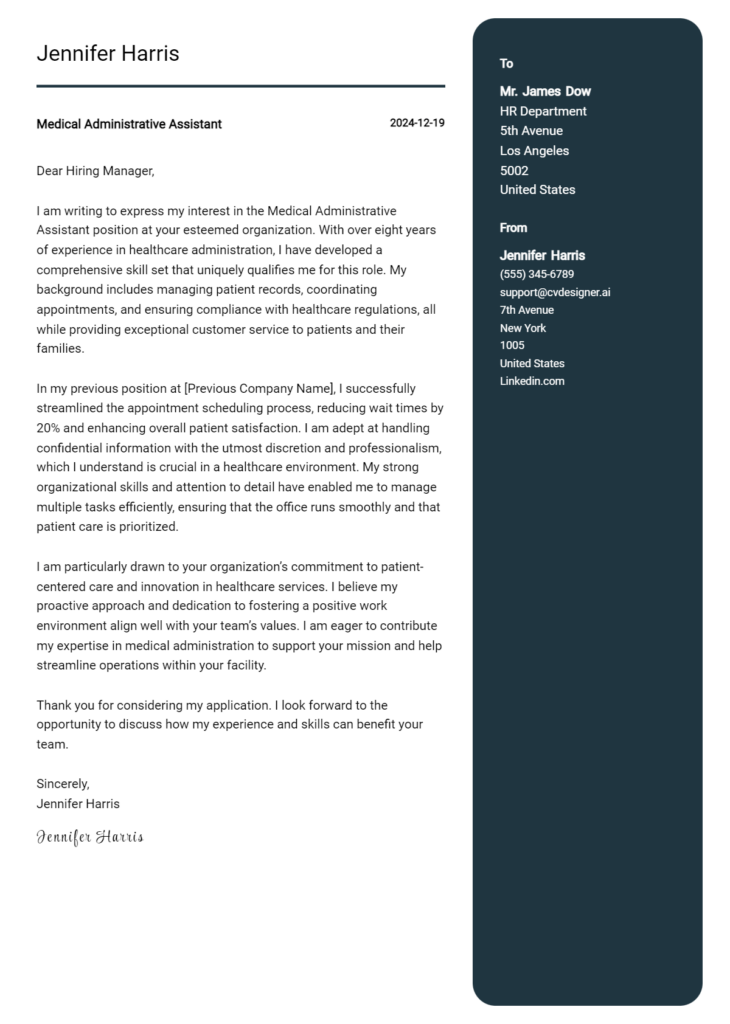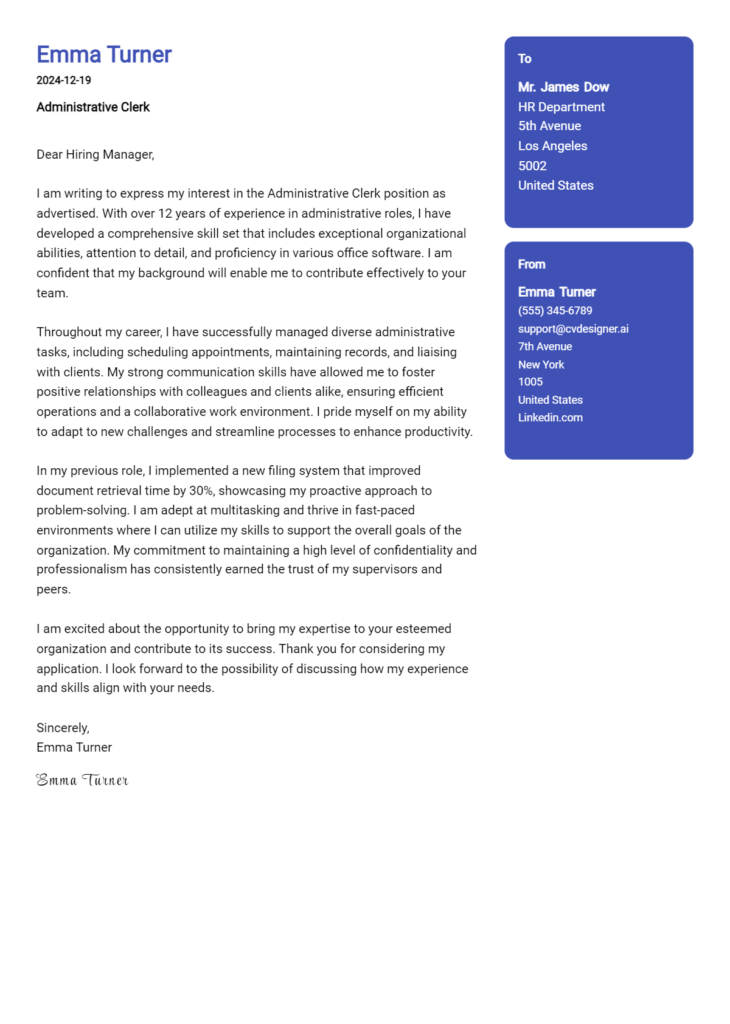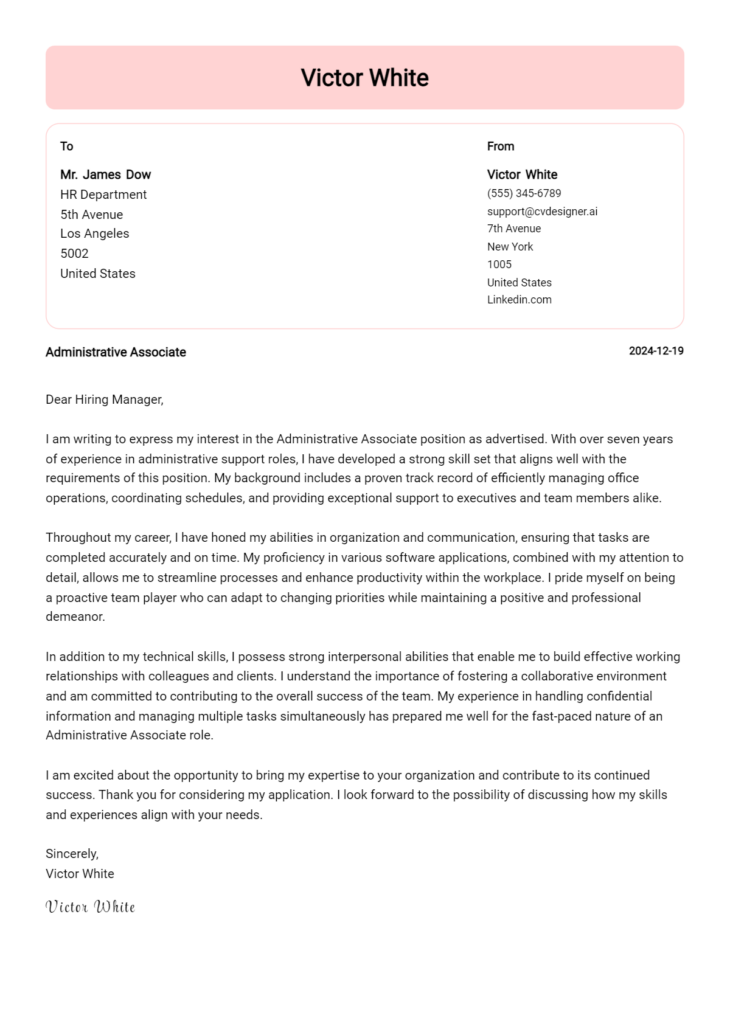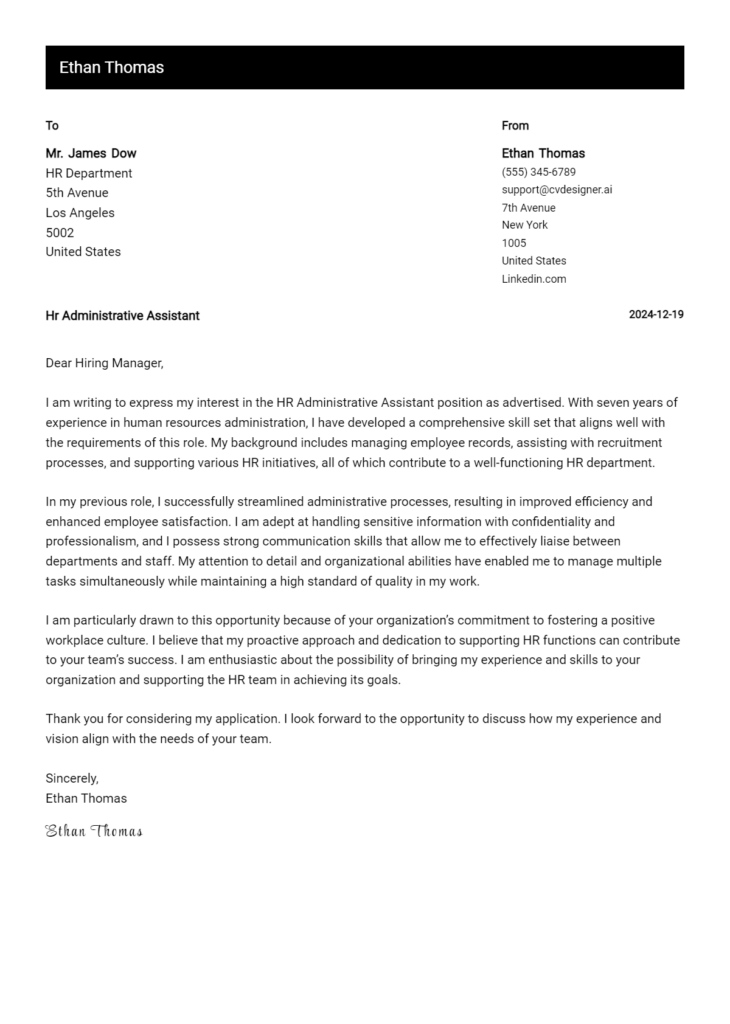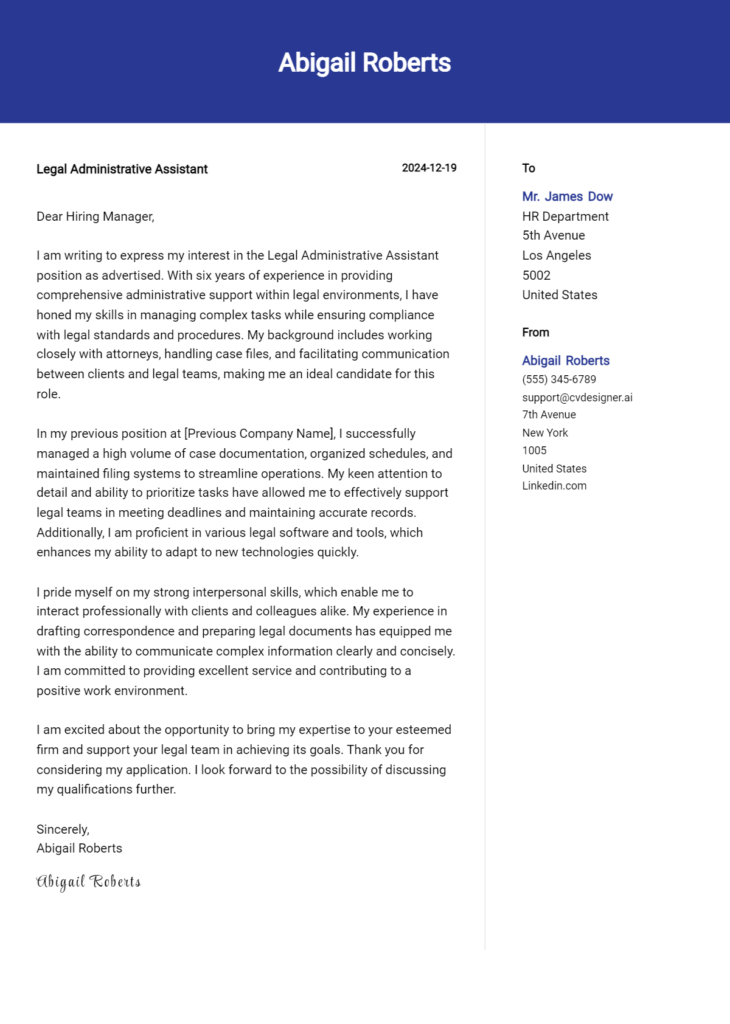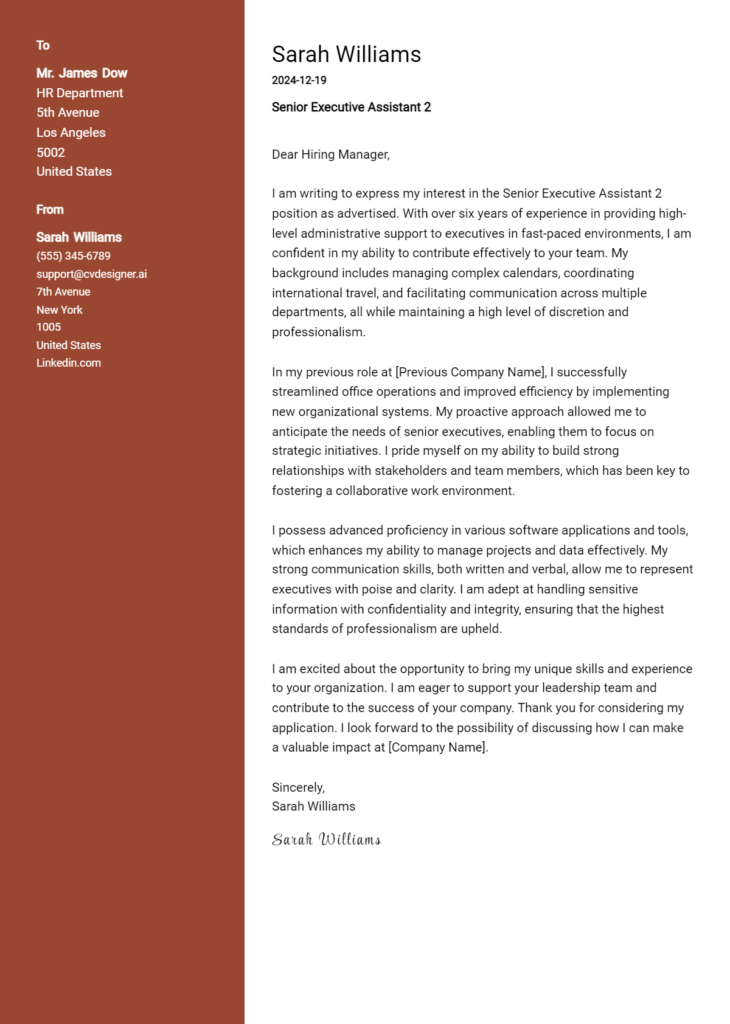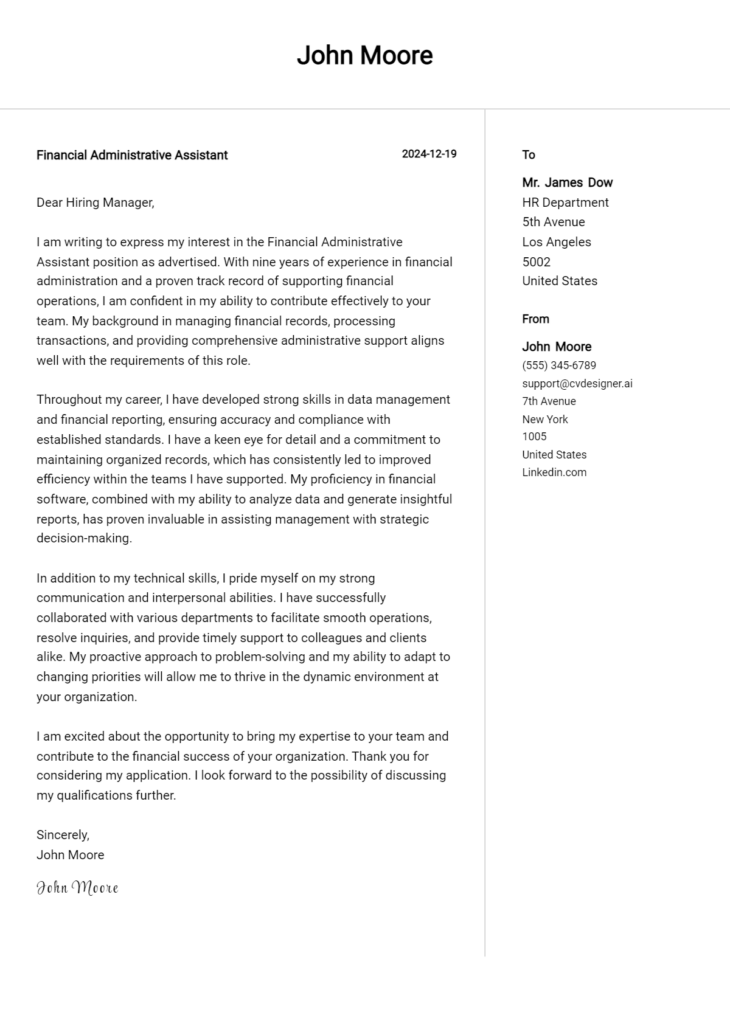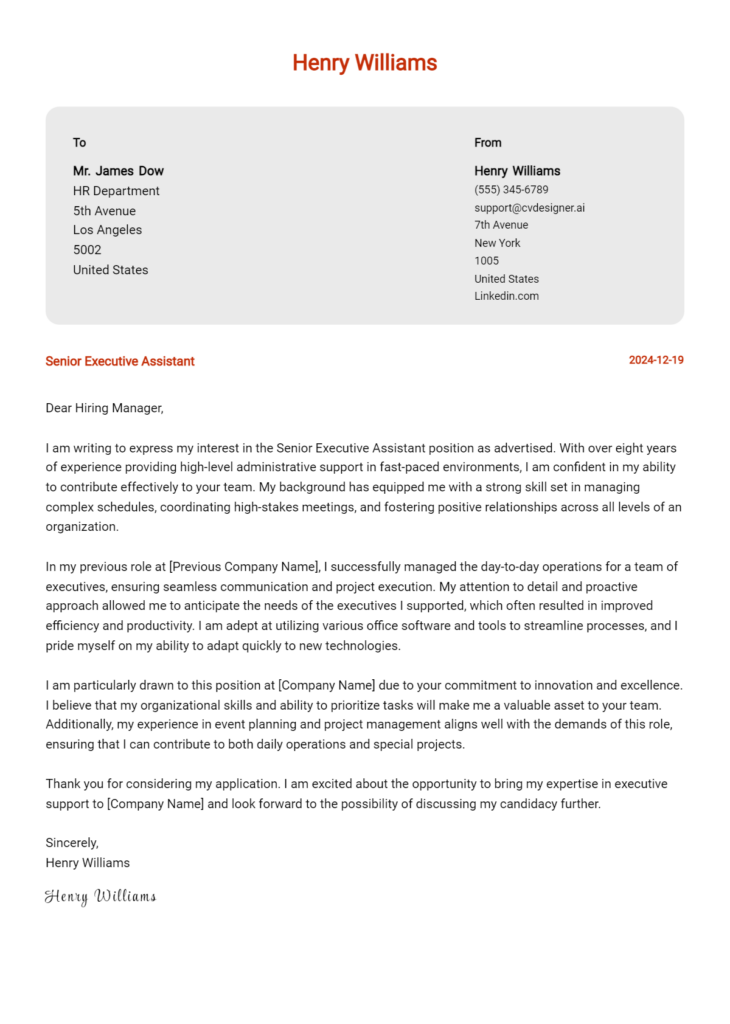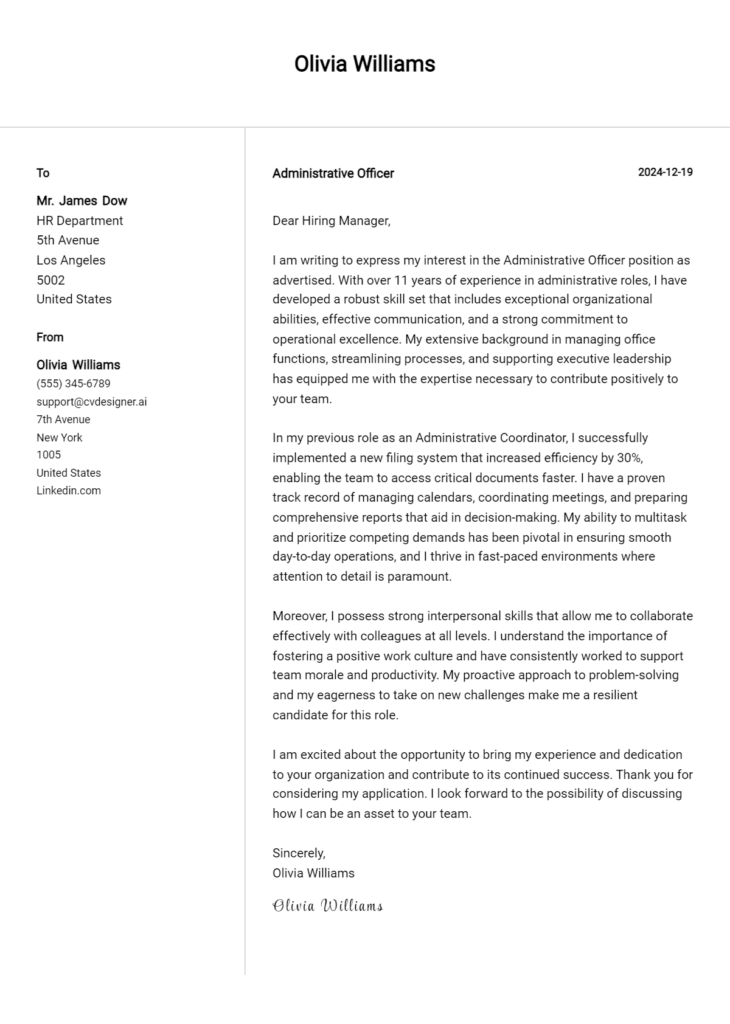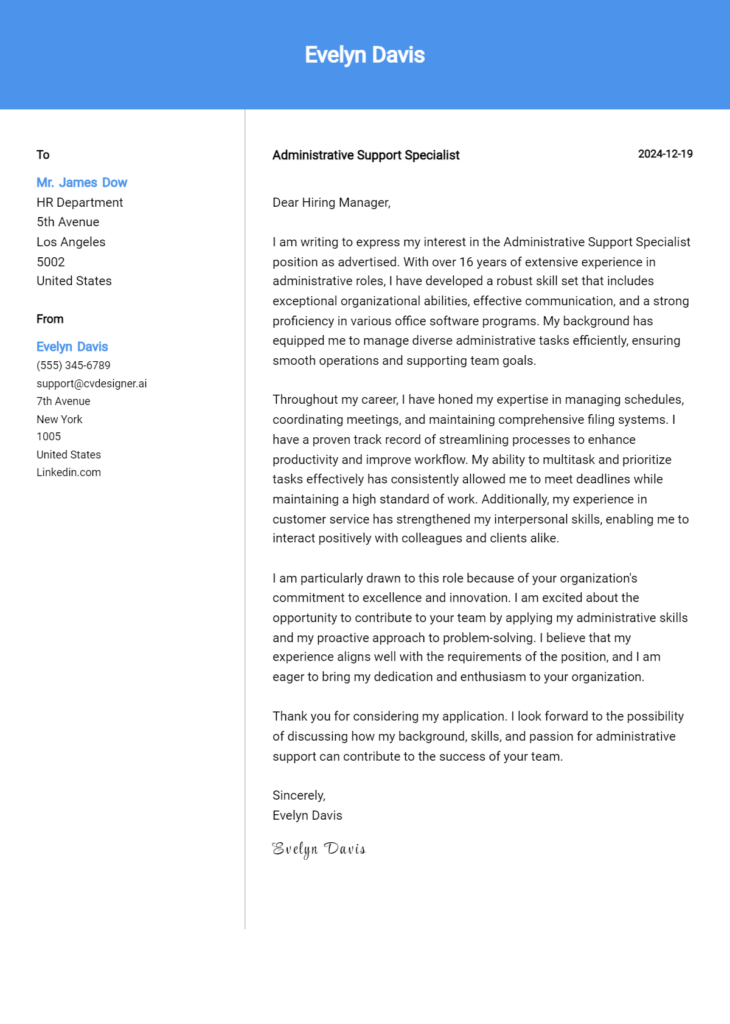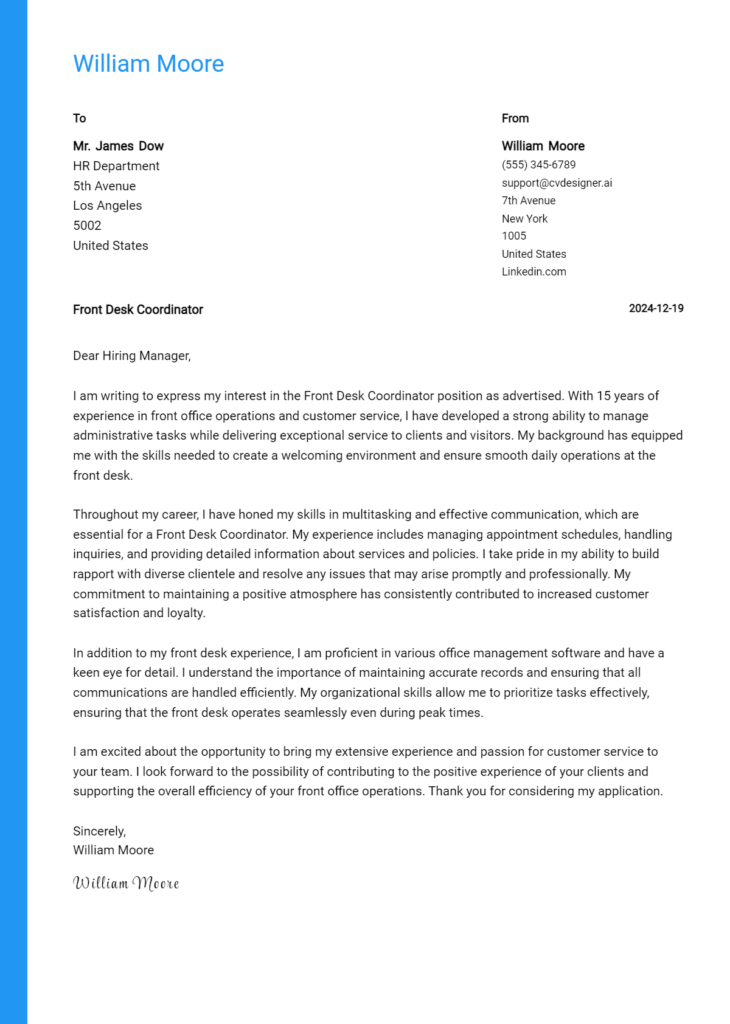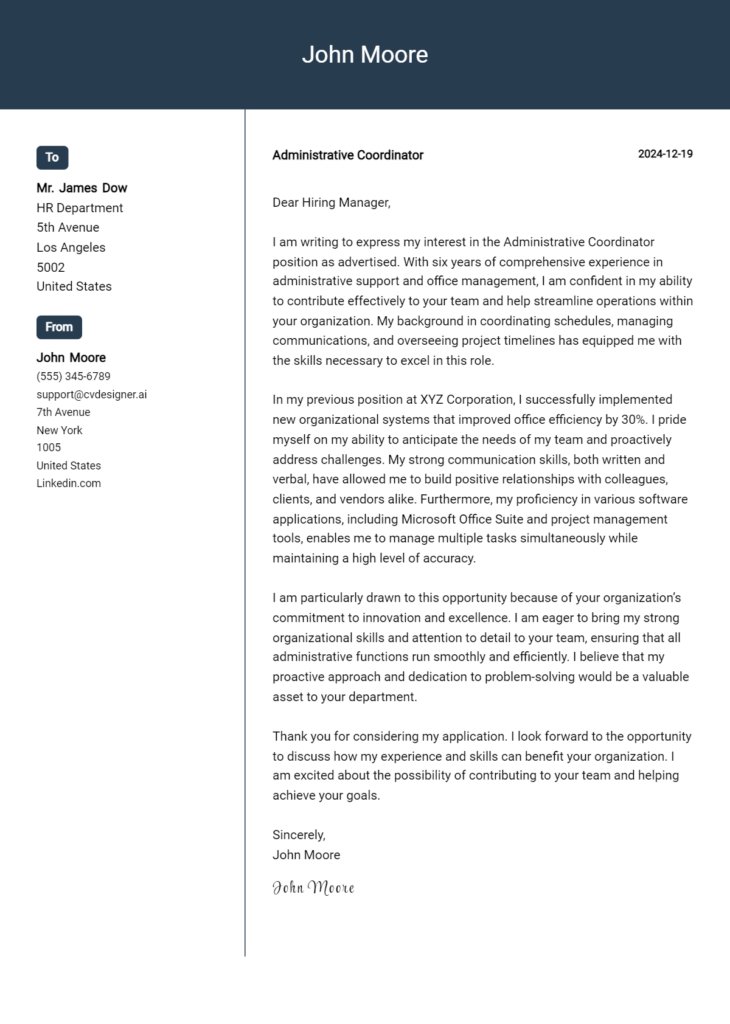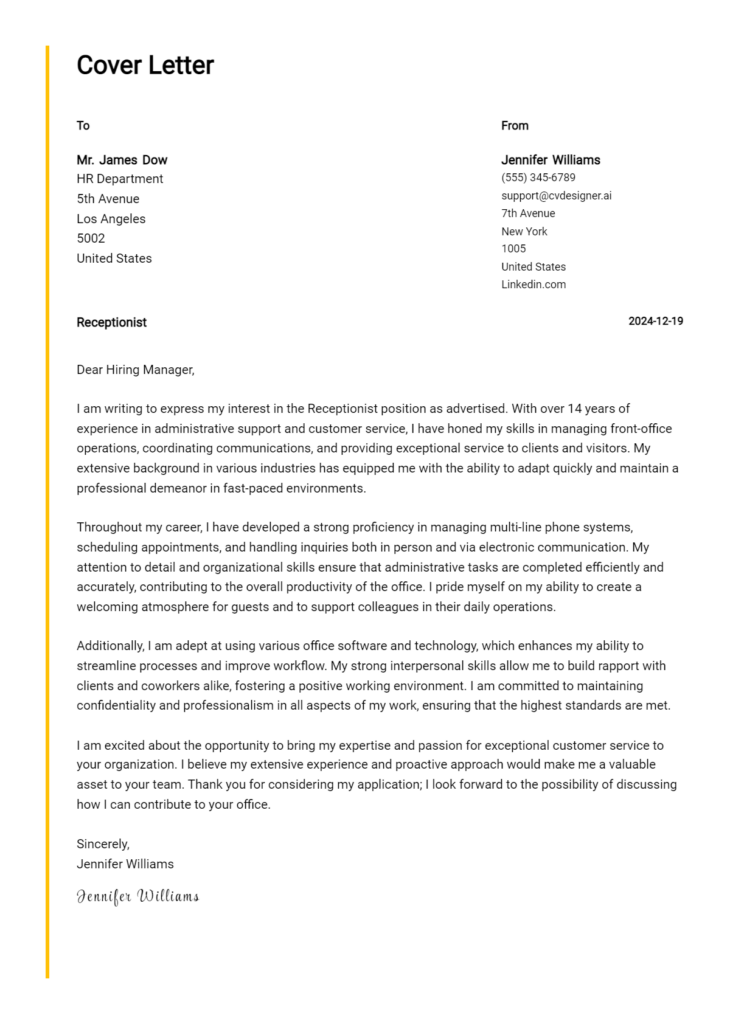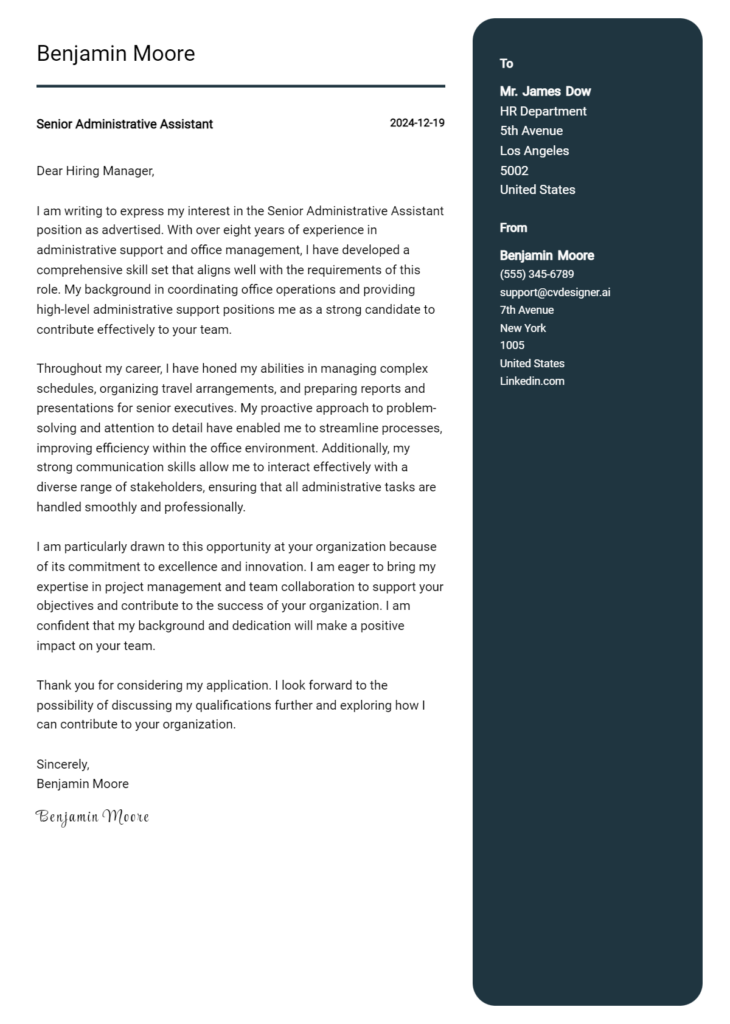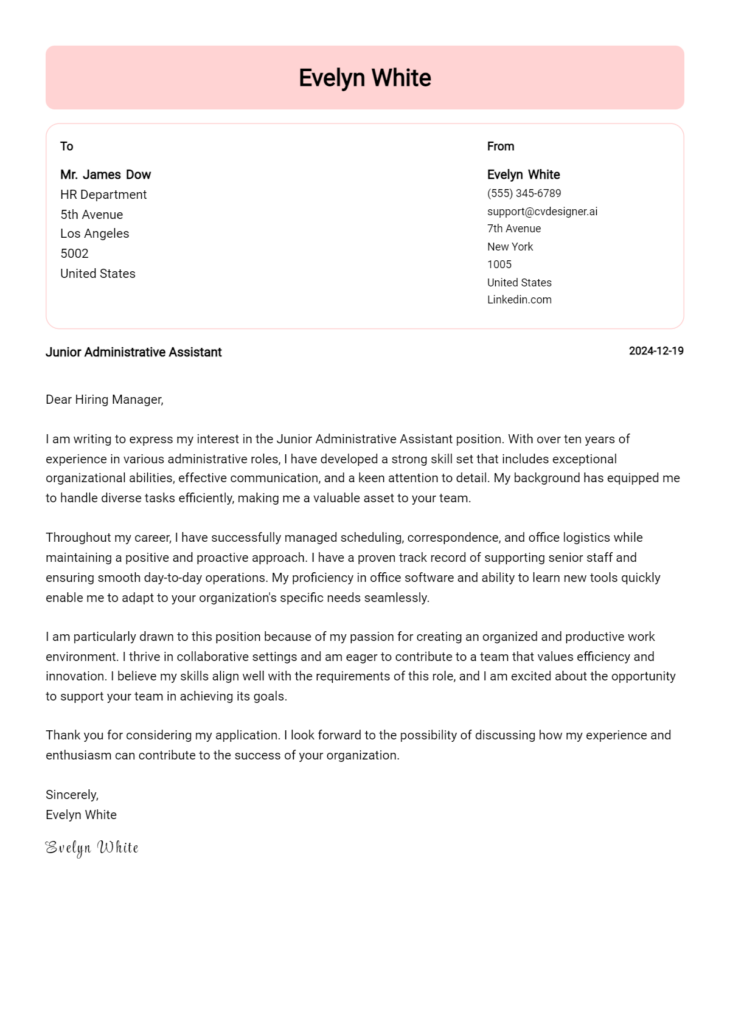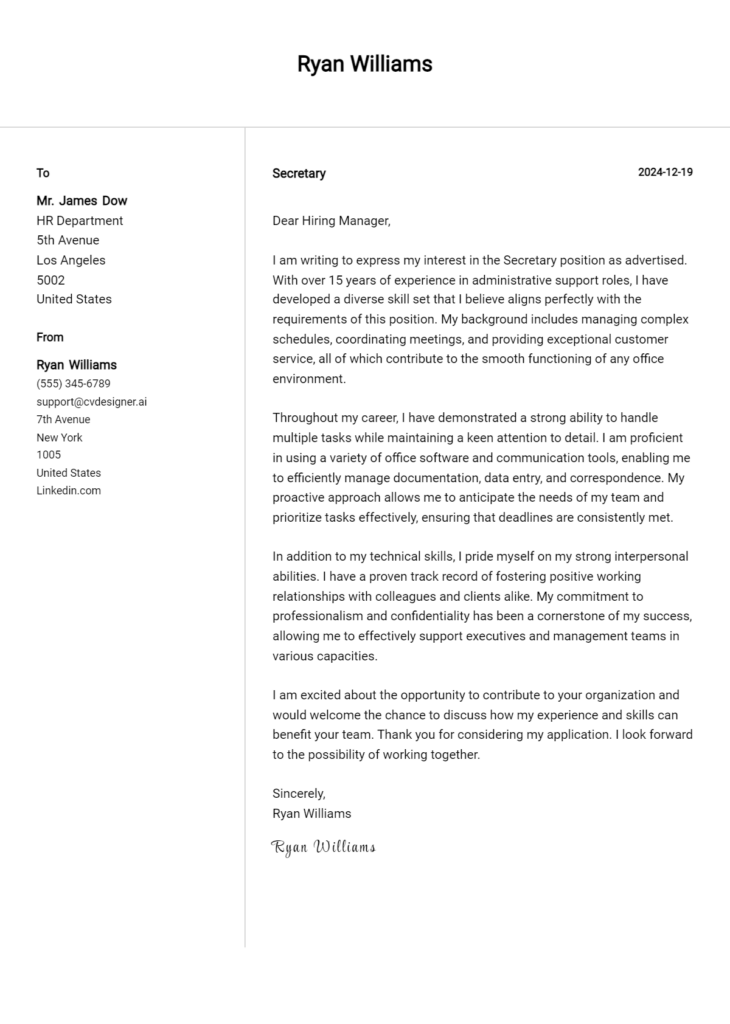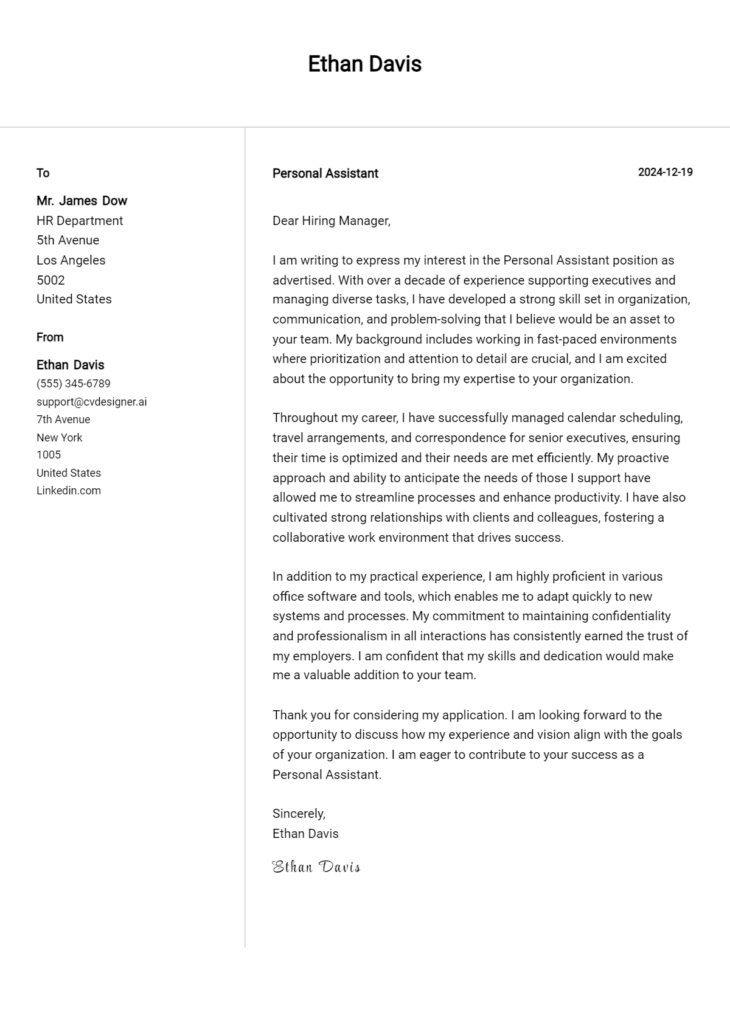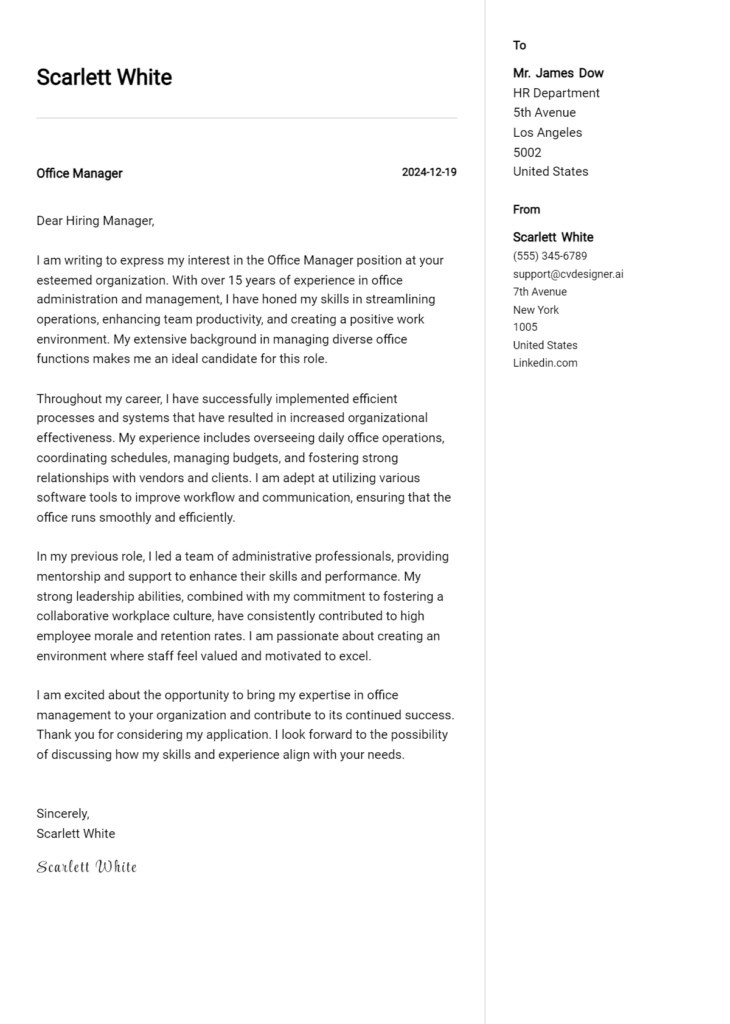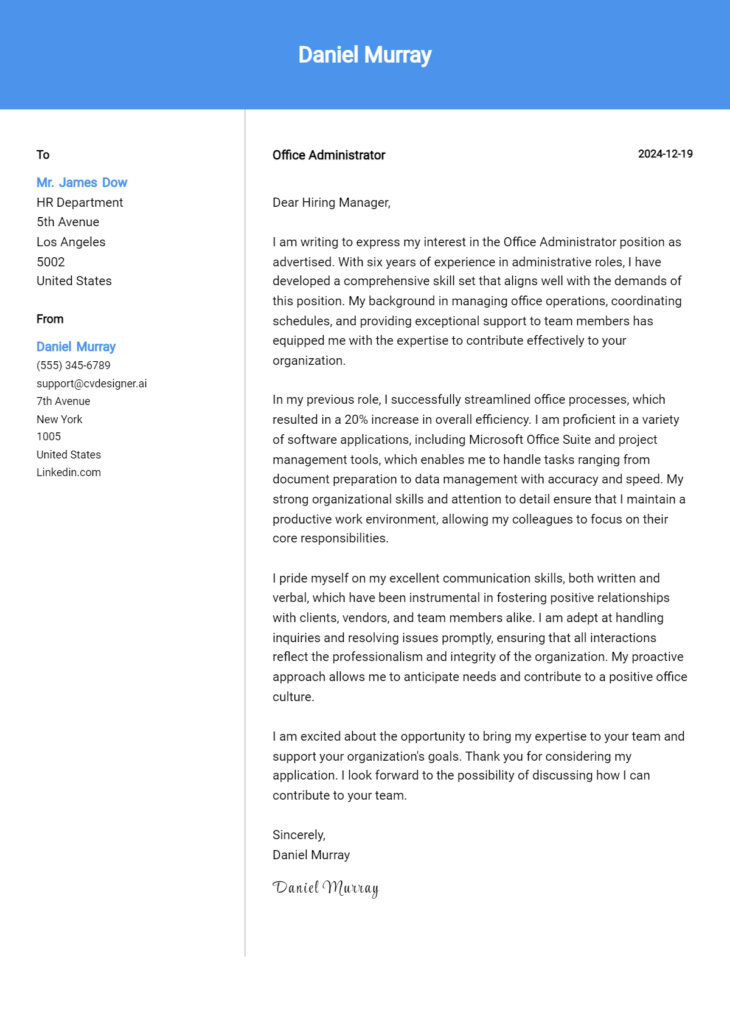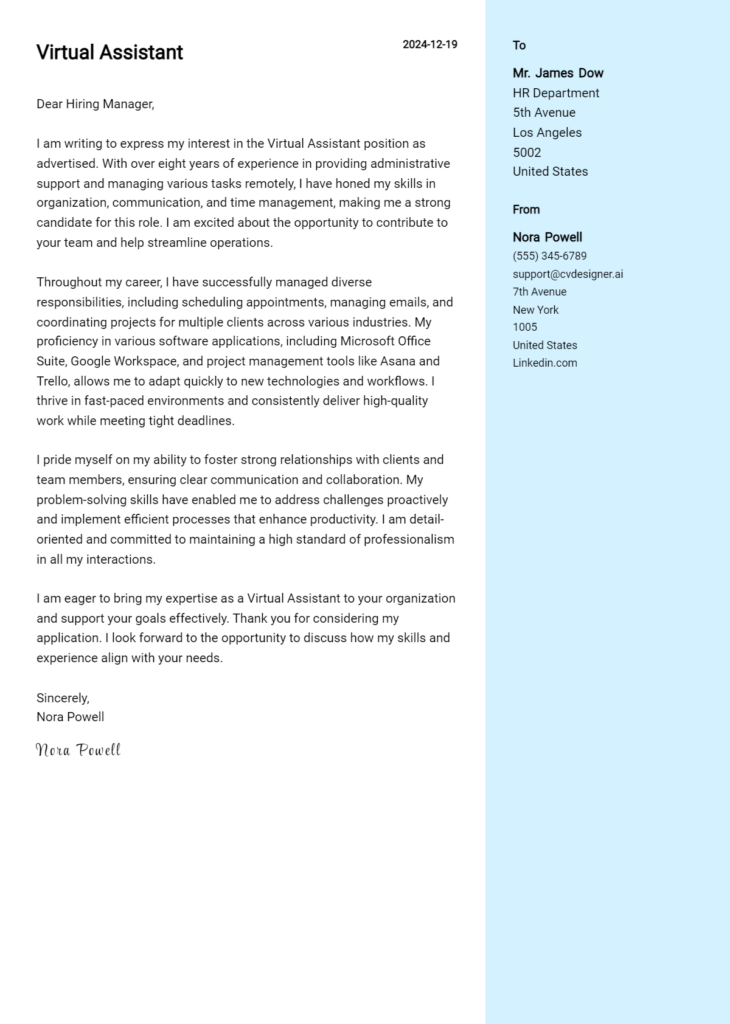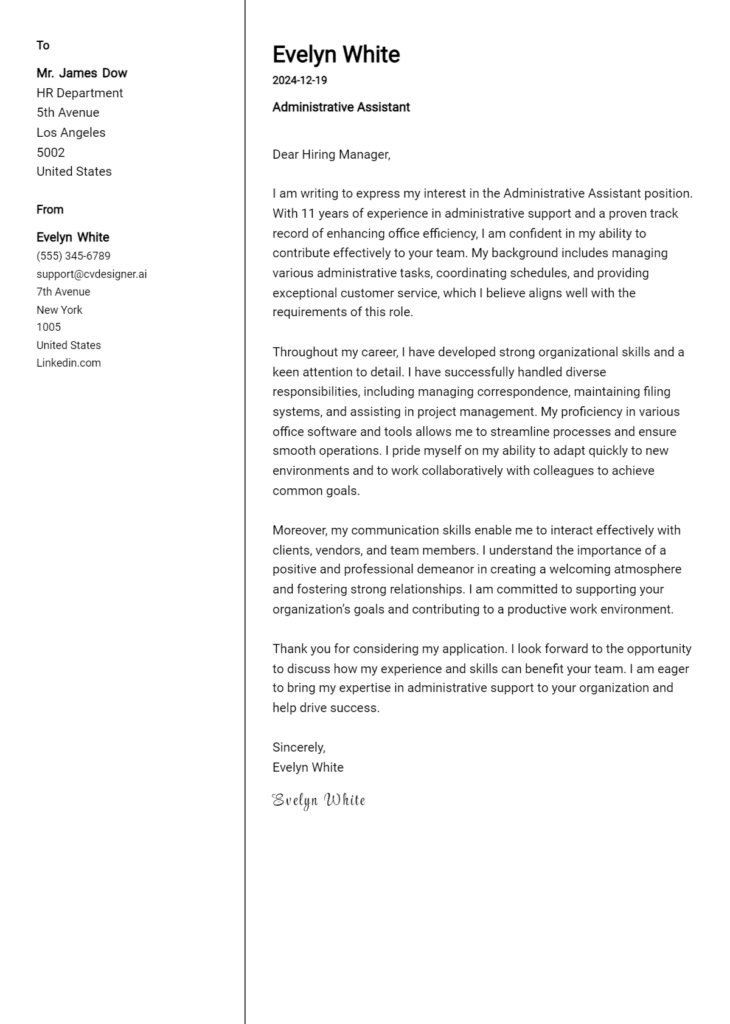Executive Assistant Cover Letter Examples
Explore additional Executive Assistant cover letter samples and guides and see what works for your level of experience or role.
How to Format an Executive Assistant Cover Letter?
Crafting an effective cover letter is essential for an Executive Assistant role, as it serves as your first impression on potential employers. The way you format your cover letter not only showcases your organizational skills but also reflects your professionalism and ability to communicate clearly—attributes that are vital in an Executive Assistant position. A well-structured cover letter can help you stand out in a competitive job market by highlighting your qualifications and demonstrating your understanding of the role's demands.
In this guide, we will explore the key components of a professional Executive Assistant cover letter, ensuring you present yourself in the best light possible.
We'll focus on the essential components of a cover letter, including:
- Cover Letter Header
- Cover Letter Greeting
- Cover Letter Introduction
- Cover Letter Body
- Cover Letter Closing
Each section is crucial in emphasizing your skills and experience. Let’s delve into each part to create a compelling Executive Assistant cover letter that captures the hiring manager's attention.
Importance of the Cover Letter Header for an Executive Assistant
The cover letter header is a crucial component of any professional correspondence, especially for an Executive Assistant role. It establishes the first impression and sets the tone for the rest of your application. A well-crafted header should include your contact information, the date, and the recipient's details to ensure clarity and professionalism. This information not only makes it easy for the hiring manager to reach you but also demonstrates your attention to detail—an essential quality for an Executive Assistant.
A strong header reflects your organizational skills and professionalism, while a weak header may convey carelessness or lack of attention. Below are examples of a strong and weak cover letter header for an Executive Assistant.
Strong Example
Jane Smith 123 Main Street Cityville, ST 12345 jane.smith@email.com (123) 456-7890 October 1, 2023 Mr. John Doe Hiring Manager XYZ Corporation 456 Corporate Blvd Business City, ST 67890
Weak Example
jane smith email: jane@email.com October 1, 2023 XYZ Corp.
The Importance of a Cover Letter Greeting for an Executive Assistant
A well-crafted cover letter greeting is crucial as it sets the tone for the entire letter and establishes a connection with the hiring manager. This initial greeting reflects your professionalism and attention to detail, demonstrating that you have taken the time to personalize your application. Addressing the hiring manager directly not only shows respect but also indicates your enthusiasm for the role. To avoid generic greetings, it is advisable to research the recipient's name and title, which can often be found on the company’s website or LinkedIn. A personalized greeting can make a significant difference in how your application is perceived.
Here are some examples of strong and weak greetings for an Executive Assistant cover letter:
Strong Greeting Example
Dear Ms. Johnson,
Weak Greeting Example
To Whom It May Concern,
The Importance of a Compelling Cover Letter Introduction for an Executive Assistant
A well-crafted cover letter introduction is crucial for an Executive Assistant position, as it sets the tone for the entire application and serves as the candidate's first impression on the hiring manager. This introduction should not only capture attention but also convey genuine enthusiasm for the role while briefly highlighting key skills or achievements that align with the job requirements. A strong introduction can differentiate a candidate from the competition, making it essential to communicate effectively and persuasively from the outset.
Strong Example:
Dear [Hiring Manager's Name], I am excited to apply for the Executive Assistant position at [Company Name], as I believe my extensive experience in managing executive schedules and my proven track record of enhancing office productivity make me an ideal fit for your team. With over five years of experience supporting C-level executives, I have successfully streamlined communication processes and implemented organizational systems that have increased efficiency by 30%. I am eager to bring my skills in project management and proactive problem-solving to [Company Name] and contribute to your continued success.
Weak Example:
To whom it may concern, I am writing to apply for the Executive Assistant job. I have some experience in this field, and I think I could do well in this role. I am a hard worker and have done administrative tasks before. I hope to get a chance to discuss my application further.
Cover Letter Body for Executive Assistant
The cover letter body for an Executive Assistant serves as a critical platform for candidates to articulate their skills, experiences, and the unique value they bring to the organization. This section allows applicants to highlight specific projects or accomplishments that demonstrate their proficiency in managing schedules, coordinating events, and supporting senior executives. By providing concrete examples of past successes, candidates can effectively illustrate how their contributions have positively impacted previous employers, ultimately making a compelling case for why they are the ideal fit for the role.
Strong Example
Dear [Hiring Manager's Name], I am excited to apply for the Executive Assistant position at [Company Name]. In my previous role at [Previous Company Name], I successfully managed the calendar for the CEO, ensuring optimal time management and prioritization of tasks. I played a pivotal role in organizing a company-wide conference that increased employee engagement by 30%, demonstrating my ability to handle high-pressure situations with finesse. Additionally, my proficiency in project management software allowed me to streamline communication between departments, reducing project turnaround time by 15%. I am confident that my strong organizational skills and proactive approach will contribute significantly to your team. Sincerely, [Your Name]
Weak Example
Dear [Hiring Manager's Name], I am writing to apply for the Executive Assistant position. I have experience in administrative tasks and can answer phones and manage calendars. In my last job, I occasionally organized meetings. I believe I would be a good fit for your company because I am detail-oriented and have good communication skills. Best, [Your Name]
Importance of the Cover Letter Closing for an Executive Assistant
The closing paragraph of a cover letter is crucial for leaving a lasting impression on the hiring manager. It serves as a final opportunity to summarize your qualifications, express your enthusiasm for the role, and encourage the next steps, such as reviewing your resume or scheduling an interview. A strong closing not only reinforces your fit for the Executive Assistant position but also demonstrates your professionalism and eagerness to contribute to the organization. Conversely, a weak closing may fail to convey your genuine interest or leave the reader uncertain about your intentions.
Strong Example
Thank you for considering my application for the Executive Assistant position at [Company Name]. With my extensive experience in managing executive schedules, coordinating projects, and providing exceptional administrative support, I am confident in my ability to contribute effectively to your team. I am genuinely excited about the opportunity to bring my skills to [Company Name] and support your leadership. I look forward to discussing how my background aligns with your needs. Please feel free to review my resume, and I hope to schedule an interview soon.
Weak Example
Thanks for reading my letter. I think I might be a good fit for the Executive Assistant job. Let me know if you want to talk or something. I have attached my resume.
These tips will help candidates craft an effective cover letter for an Executive Assistant position. A well-written cover letter not only highlights your professional experience but also showcases your technical skills, problem-solving abilities, and knowledge of Software Development Life Cycle (SDLC). Additionally, emphasizing your teamwork capabilities and passion for continuous learning can set you apart from other candidates.
Cover Letter Writing Tips for Executive Assistant
Showcase Technical Skills: As an Executive Assistant, familiarity with various software and tools is crucial. Make sure to highlight your proficiency in project management software, calendar management tools, and communication platforms. Use specific examples of how these tools have helped you streamline processes or enhance productivity in previous roles.
Demonstrate Problem-Solving Abilities: Employers value candidates who can think critically and resolve issues efficiently. Include a brief anecdote in your cover letter where you successfully navigated a challenging situation. Explain the steps you took to find a solution and the positive outcome that followed, demonstrating your ability to handle unexpected challenges.
Highlight SDLC Knowledge: If applicable, mention your understanding of the Software Development Life Cycle. Describe how your insights into this process can assist teams in project management or administrative coordination. Even basic knowledge can be beneficial, so don’t hesitate to include any relevant coursework or experiences.
Emphasize Teamwork and Collaboration: Executive Assistants often work closely with different departments and team members. Illustrate your teamwork skills by providing examples of successful collaborations in past positions. Discuss how your ability to foster strong working relationships has contributed to the success of projects or initiatives.
Express a Passion for Continuous Learning: The best candidates are those who are committed to personal and professional growth. In your cover letter, mention any recent courses, certifications, or workshops you have completed. This shows potential employers that you are proactive and willing to adapt to new challenges and technologies.
For additional guidance, consider using cover letter templates or a cover letter builder to help structure your document effectively.
Common Mistakes to Avoid in an Executive Assistant Cover Letter
Crafting a compelling cover letter is essential for landing an Executive Assistant position, as it is your first opportunity to make a positive impression on potential employers. To enhance your chances of success, it's crucial to avoid common pitfalls. Here are some mistakes to look out for and tips on how to steer clear of them:
Generic Language: Using a one-size-fits-all approach can make your cover letter feel impersonal. Tailor your letter to the specific job and company by incorporating relevant details about their operations or values.
Lack of Specificity: Failing to provide concrete examples of your skills and experiences can weaken your application. Use quantifiable achievements to demonstrate your capabilities, such as successfully managing schedules or improving office efficiency.
Spelling and Grammar Errors: Typos can undermine your professionalism. Always proofread your cover letter multiple times and consider using grammar-checking tools to catch mistakes.
Not Addressing the Hiring Manager: Sending a cover letter without a personal salutation can come off as generic. Take the time to find the name of the hiring manager and address them directly to establish a connection.
Overly Lengthy Content: A lengthy cover letter can lose the reader's interest. Aim for a concise and focused letter, ideally no longer than one page, highlighting your most relevant qualifications.
Neglecting Formatting: Poorly formatted cover letters can detract from your message. Use a professional cover letter format and ensure your layout is clean and easy to read.
Failing to Include a Call to Action: Concluding your letter without a strong call to action can leave it feeling unfinished. End with a statement expressing your enthusiasm for the role and indicating your desire for a follow-up conversation.
By avoiding these common mistakes, you can create a polished and persuasive cover letter that stands out. For more inspiration, check out these cover letter examples to guide your writing process.
Cover Letter FAQs for Executive Assistant
What should I include in my cover letter for an Executive Assistant position?
In your cover letter for an Executive Assistant role, focus on your organizational skills, attention to detail, and ability to manage multiple tasks efficiently. Start with a strong introduction, mentioning the position you are applying for and how you found out about it. Highlight relevant experience, such as calendar management, travel coordination, and communication skills. Be sure to include specific examples of how you've contributed to your previous employers' success. Additionally, convey your understanding of the company's goals and how your skills align with their needs. Conclude with a strong closing statement that expresses your enthusiasm for the role and your desire to contribute to the team.
How long should my cover letter be?
Your cover letter should ideally be one page long, consisting of three to four paragraphs. Aim for a length of around 250 to 400 words. Brevity is key, as hiring managers often have limited time to read through applications. Ensure each paragraph serves a purpose: the first should introduce yourself and the position, the second and third should outline your relevant experiences and skills, and the final paragraph should express your interest and willingness for an interview. Use concise language and avoid unnecessary filler to keep your letter engaging and focused.
Should I customize my cover letter for each application?
Absolutely! Customizing your cover letter for each Executive Assistant application is crucial. Tailoring your letter demonstrates genuine interest in the position and shows that you have taken the time to research the company and understand its culture and values. Use keywords from the job description and align your skills and experiences with the specific requirements of the role. Mention the company's name and reference any mutual connections or knowledge of the organization that can strengthen your application. Personalization not only helps you stand out but also allows you to present yourself as a perfect fit for the role.
How can I make my cover letter stand out?
To make your cover letter stand out, start with an engaging opening that captures the reader's attention. Use a compelling story or a relevant achievement to illustrate your skills. Focus on the specific qualifications that are most relevant to the Executive Assistant position, using quantifiable achievements whenever possible. Additionally, incorporate keywords from the job description to pass through applicant tracking systems. Maintain a professional tone while showcasing your personality, which can help the hiring manager connect with you. Finally, conclude with a call to action, expressing your eagerness for a follow-up and reiterating your interest in the position.
Build your Cover Letter in minutes
Use an AI-powered cover letter builder and have your letter done in 5 minutes. Just select your template and our software will guide you through the process.

